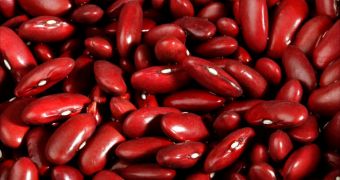Do you like Mexican chili? Hot and spicy... But if you think the problem posed by the beans is the "jet propulsion", you're wrong. Lectins, a type of proteins with natural insecticide qualities and found in abundance in raw legumes and grains, can have more severe temporary effects.
Lectins strongly adhere to carbohydrates found on the cell surfaces, especially the heavy-sugary coats of epithelial cells on the gastrointestinal line. It was long known that undercooked beans, due to lectins, can provoke nausea, diarrhea and vomiting, but how precisely these proteins did their job was not known.
A new research reveals how lectins disable GI tract cells, which are under a constant bombardment while digesting food, from fixing tears in cells walls resulted from digestive activity. Repair usually takes place in a few seconds: internal membranes move up to patch the tear and the one-cell line of the GI tract stays intact.
"If those individual cells cannot repair tears, they die. That means you have gaps in the integrity of the surface area of the epithelium and you are exposing the nasty internal world of your GI tract to your blood supply." said Dr. Paul L. McNeil, cell biologist at the Medical College of Georgia.
The intact GI epithelial line permits only good stuff like food to cross to the blood.
"Your body senses that lack of barrier function and tells you to eliminate the entire contents of the GI tract. If you get vomiting and diarrhea you are going to eliminate the entire contents of your gastrointestinal tract, right" said McNeil.
Lectins are considered in the same way a natural insecticide, only that the insect's gut is formed just by one cell line and they die. "Alcohol will do the same thing. When you drink too much alcohol, you can destroy the lining of your stomach." said McNeil. Paradoxically, McNeil's team found in 2006 how roughage, which includes beans, help individuals stay "regular" by inducing more cell tears, allowing more mucus to be released from cells and greasing this way the GI tract.
But the recent study shows how lectin is also very effective at blocking mucus release from cells. Lectin's action in impeding cell-patching and mucus release was found while investigating roughage. The researchers found that too much lectin means no patching or mucus, just dead cells.
"Biologically it's interesting because it might tell us more about the mechanism of repair. We know the mechanism involves surface binding because you can add lectin and the cells can't repair. You take the same culture of cells, wash the lectin away, injure other cells in the culture and they repair fine. We also know it's a very rapid, surface-initiated inhibition," said McNeil. But besides the temporary discomfort induced by undercooked beans and rice, long term consumption of lectin can also provoke colorectal cancer and celiac disease (sensitivity to gluten, a mix of wheat proteins including lectins), in which the small intestine cannot properly absorb nutrients after gluten consumption.
Interestingly enough, in a lab dish, safe from mechanical stress that provokes surface tears, lectin can induce cell division, "which is quite the opposite of making cells sick," said McNeil. A recent research linked lectin also to diabetes.
"It's possible that this bioactive property of lectin that binds to our cells could have long-term consequences taken even in small amounts. Cooking destroys most but not all lectin. Maybe the bloating and gas is telling us something about lectin when it's just a minor irritation. Lectin is easily among the top-10 causes of food poisoning but is unlikely to be lethal because the body is so good at sensing the break in the GI barrier and eliminating the problem," added McNeil.

 14 DAY TRIAL //
14 DAY TRIAL //